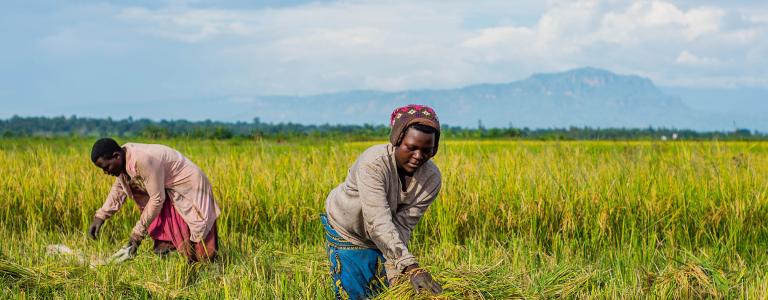Food Systems Transformation
IISD helps governments design policies that incentivize sustainable farming practices and promote improved food security and nutrition.
Our food systems are close to breaking point. Climate change, conflict, and economic challenges have driven the proportion of the world’s population who are food insecure to almost a third. Our food systems are also major drivers of climate change and biodiversity loss—meaning they are threatening the very ecosystems upon which they depend.
The need to better connect the dots between food systems, climate change, and health is clear. The question is how. Globally, leaders are increasingly recognizing the urgent need to transform their food systems to make them more sustainable, but their policies are often not fully consistent with this objective. This is particularly true of agricultural subsidies, which, in many cases, incentivize unsustainable production and consumption patterns.
We seek to inform and support more coherent use of public policies, including subsidies, to incentivize sustainable agriculture and spur food systems transformation. We conduct in-depth research to provide governments with evidence and insights to help them design coherent policy mixes that achieve multiple sustainable development objectives, such as improving nutrition and tackling greenhouse gas emissions from agriculture. We also provide insights into how governments can repurpose their existing support to agriculture to incentivize more sustainable farming practices.
Publications and Events
Modelling the Impacts of Policy Interventions for Agrifood Systems Transformation in Indonesia
This report provides context and insights for agrifood systems transformation efforts in Indonesia by detailing an innovative modelling approach and offering policy implications and next steps to inform the Indonesian government's development planning.
What's Next After COP 28: Food systems
Slated to be a game changer for food systems transformation, COP 28 ended with mixed results. Our expert unpacks the wins and disappointments for food systems and what’s needed next.
How Can We Transform Food Systems to Meet Food, Nutrition, and Climate Needs?
This article outlines three key policy measures that can help governments meet the food and nutritional needs of their people in the context of a changing climate.
Food Systems and Agriculture: What’s on the menu for COP 28?
Our agriculture expert Claire McConnell explains the importance of food systems transformation in addressing climate change and how can it be achieved, particularly within the context of COP 28.
Latest
You might also be interested in
Supporting Investors and Agribusinesses to Invest Responsibly in Food and Agriculture
Evidence and tools to help investors and agribusinesses apply principles for responsible investment in agriculture and food systems.
Advice and Support for Governments on Promoting Responsible Investment in Agriculture
IISD provides demand-driven advice, support, and training to help governments establish robust laws and policies for promoting responsible investment in agriculture.
Evidence on Investing Responsibly in Agribusinesses: A series of case studies
A series of case studies exploring agribusinesses’ experiences in applying principles for responsible investment in agriculture.
Sustainable Food Systems in Canada
In 2021, a team of IISD experts completed an internal exercise that sought to map out a path for sustainable food systems in Canada.





